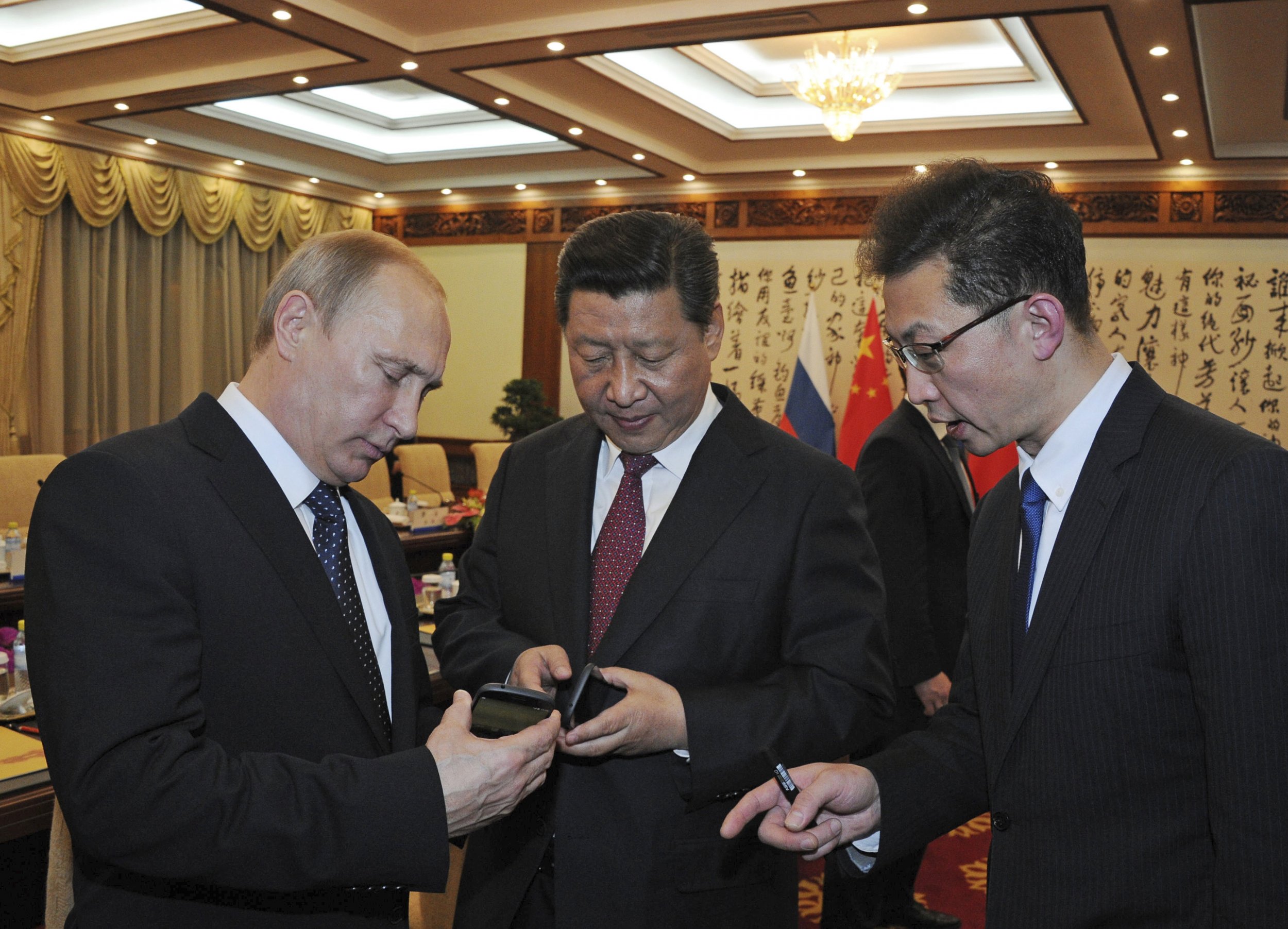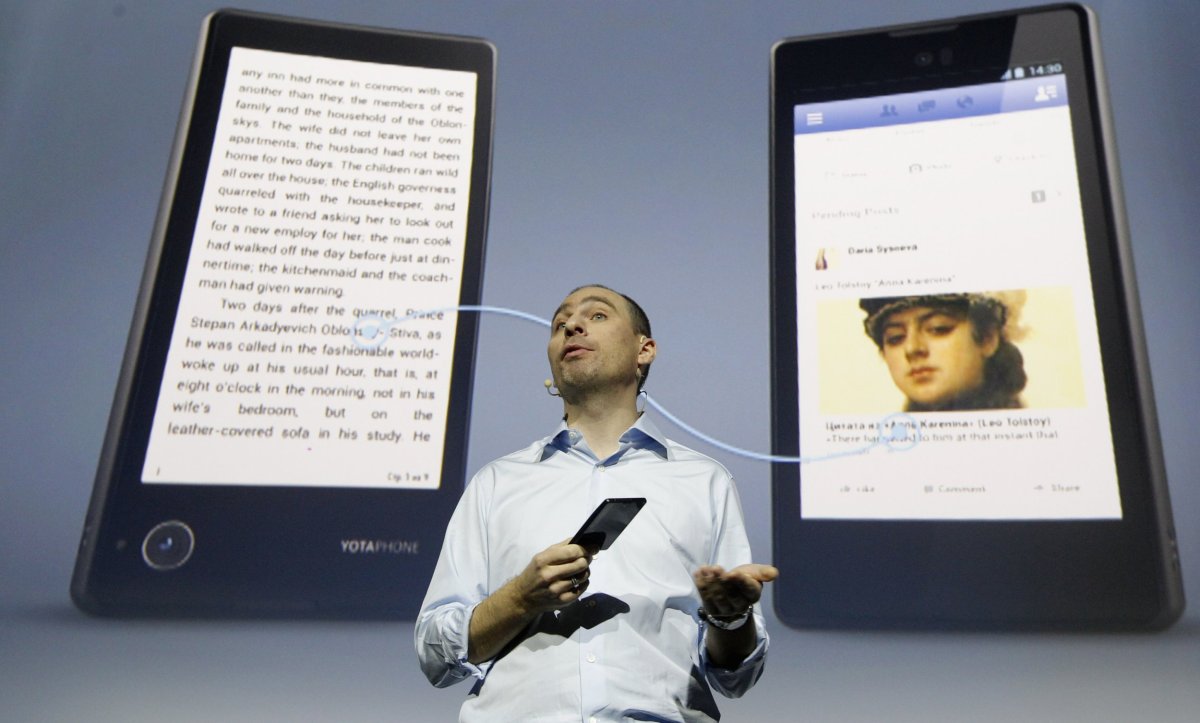
In the innocuous surroundings of London's Brick Lane, behind a doorway crowded with smokers and looking like the entrance to the average high-end East London boozer, tech junkies and journalists alike have gathered to catch a glimpse of the brand new gadget that has unwittingly become Russia's new propaganda weapon.
The YotaPhone 2 is a curious dual-screened smartphone that works with Google Android and boasts a regular five-inch colour touchscreen on one side and a 4.7-inch black and white e-reader touchscreen on its back, allowing for a nifty new way of running apps, conserving battery life and generally using your smartphone. Despite its creators' lofty ideals to revolutionise the industry triggering weary eye-rolling, critics have been pleasantly surprised by the YotaPhone 2.
The phone has the power of a small netbook with 2GB of RAM and 32GB of fixed storage, while its creators promise the phone's low energy consuming second screen gives it a battery life of up to six days.
"At YotaPhone, we wanted to create a new kind of smartphone because the way we use smartphones today is different yet the smartphones on the market have not changed in eight years," Vlad Martynov, creator of the first YotaPhone and company CEO tells Newsweek.
Touted by state-backed news channel Russia Today as 'the Russian iPhone', however, it has become something far more symbolic to the Kremlin, keen to promote it as a testament to Russian ingenuity. The YotaPhone 2 has found fans among Russian President Vladmir Putin, who recently gave two YotaPhones to his Chinese counterpart Xi Jinping last month.
Russian prime minister Dmitry Medvedev, meanwhile has Instagrammed his commendation of his prototype YotaPhone on several occasions, while even Chechen leader Ramzan Kadyrov has chimed in on the phone's brilliance over U.S. products.
Kadyrov openly endorsed it over Apple's products urging Russians: "Do not buy the iPhone. Patriotism and love for your country come through in deeds. The YotaPhone 2 is a work of unique Russian craftsmanship, peerless around the world."
"America calls Russia the enemy yet our citizens buy U.S. smartphones by the million and fund the U.S. armed forces," Kadyrov raved shortly before a Russian paper photographed him back on his iPhone.
The story of the YotaPhone is a classic start-up success tale according to Vlad Martynov, who is less keen to present the phone as a symbol of Russian engineering.
"We are an international company," Martynov says, playing down the Kremlin connection. "We have research and development offices in Finland, Moscow, software and research development centre in Singapore and a smaller one in Canada."
Indeed throughout the evening's launch event there are few reminders of YotaPhone's Russian roots other than Martynov's accent and the hush tones of Russian speech exchanged between some of the catering staff.

"I started out with a software business in the 1990s in Russia and when I had the idea for YotaPhone with a friend of mine who was a seller, it was very difficult to convince shareholders were going to change the world, because we had never worked on smartphones before," he says.
According to Martynov, the Singaporean company IP, responsible for bankrolling the first Blackberry phones were YotaPhone's first big backers.
"For us to be successful we need to build a global business. For us the key target markets are China, Indonesia, Malaysia. Of course there is Russia, but you need to be very business minded in the smartphone market," Martynov says.
"We know that Indonesia are keen to experiment with interesting products in the smartphone market. We know that Europe and the U.S. are looking for stylish high quality products so we want to go global."
Despite Martynov's cosmopolitan vision for his product, however, Russia's press and government have been unrelenting in laying claim over it. The push to claim the YotaPhone as a symbol of "patriotic innovation" has followed several public discussions by Russia's parliament and ministry of defence concerned that iPhones and U.S. consumer technology may be compromising Russian security.
Kevin Rothrock project editor at Global Voices and expert on digital tech in Russia says this is no coincidence.
"The phone is a classic Russian story of smart engineering drowning in farcical governance," Rothrock says.
"For the last year, if not more, there have been regular murmurs from the government and various Duma deputies that Russia should ban Apple products in a new round of anti-Western sanctions," Rothrock says.
"Sometimes this is suggested as a general embargo, and other times it's proposed as something that would apply only to civil servants."
Last month the Russian ministry of defence had to address and deny claims made by the press that it had banned soldiers from using Apple iPhones because they give away valuable information to the U.S. government.
Earlier, in September, Russian MP Aleksei Lysovenko called for a ban on the iPhone 6 and other apple products in Russia, tweeting the idea from an iPhone.
According to Rothrock the YotaPhone has become simply another tool for Russian officials to pit East and West against one another for publicity's sake.
"Russian officials are fond of beating up the U.S. about all the recent NSA surveillance revelations, however with systems like SORM, the Russian government's capacity for wiretaps and Internet surveillance in purely legal terms is actually much greater," Rothrock adds.
"The Yotaphone is running Google Android for goodness sake. If it is so deathly afraid of CIA snooping, why is Russia putting Californian software on its noble indigenous hardware?"
The two-screened gadget is now on sale for £555 in the UK with a studio next to its launch venue in London's Brick Lane now turned into a shop.
Uncommon Knowledge
Newsweek is committed to challenging conventional wisdom and finding connections in the search for common ground.
Newsweek is committed to challenging conventional wisdom and finding connections in the search for common ground.
About the writer
I am a Staff Writer for Newsweek's international desk. I report on current events in Russia, the former Soviet Union ... Read more
To read how Newsweek uses AI as a newsroom tool, Click here.








